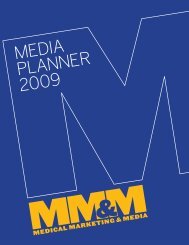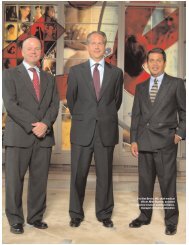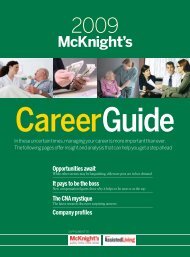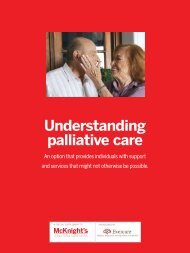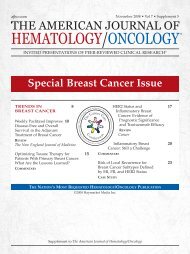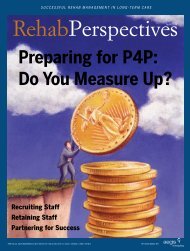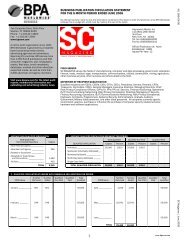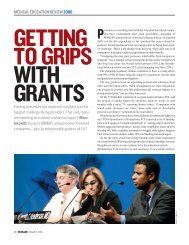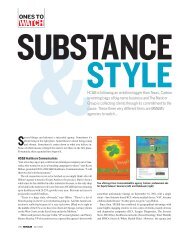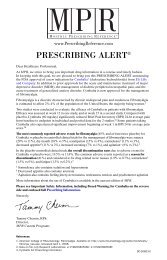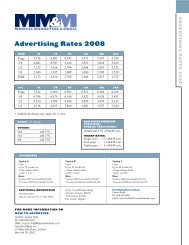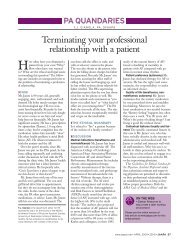global marketing research - Haymarket
global marketing research - Haymarket
global marketing research - Haymarket
Create successful ePaper yourself
Turn your PDF publications into a flip-book with our unique Google optimized e-Paper software.
GLOBAL<br />
MARKETING<br />
RESEARCH<br />
PHOTO: JUPITER IMAGES<br />
There’s more to conducting <strong>marketing</strong> <strong>research</strong> overseas than translating<br />
survey questions and hiring local moderators to do interviews. Bart Weiner and<br />
Brian Hull offer a guide to getting it right in the world’s biggest markets<br />
One of the biggest developments in the pharmaceutical industry in<br />
recent years has been the evolution and growth of markets<br />
outside of the US. In just the past six years, the revenue attributed<br />
to overseas markets has grown from 35% to 45% of total pharma industry<br />
revenues. With this growth has come the need for marketers to<br />
understand the top foreign markets with the same depth and clarity with<br />
which they understand the US market.<br />
Many issues that were once only local to the US are now viewed<br />
broadly across the major markets throughout the world. To formulate<br />
their strategies and tactics, <strong>marketing</strong> teams must now answer a more<br />
complex set of questions:<br />
What is the future need for our product in various countries? What<br />
are the important clinical endpoints for our product on a <strong>global</strong> scale<br />
and within specific countries of interest? What segmentation strategies<br />
JUNE 2007 MM&M 55
PHOTO: JUPITER IMAGES<br />
General Tips for Conducting International<br />
Marketing Research<br />
Time is relative and people in different<br />
countries and cultures drum to their<br />
own beat. If you try to change<br />
people’s ingrained behavior, you<br />
will only feel frustrated. For example,<br />
Americans like the expression “time is<br />
money” and prefer to get down to business<br />
at a moment’s notice. Professionals in other<br />
countries prefer to get to know each other<br />
first and gain a feeling of trust prior to<br />
conducting business.<br />
Here are some general tips to consider:<br />
■ Remind yourself of the need to be patient, flexible<br />
and adaptable<br />
• “As soon as possible” does not have universal meaning<br />
■ Develop partnerships<br />
• Good local qualitative moderators are hard to find<br />
• Never underestimate the value of a quality <strong>research</strong> facility<br />
■ Have a backup plan for everything<br />
• Internet access is unpredictable (plan to use your personal<br />
e-mail account)<br />
• Bring extra versions of stimuli<br />
■ Expect travel delays and manage jet lag<br />
• Get to the first country a day early to adjust your sleep patterns<br />
• Beware of labor strikes (airlines, taxis, buses and trains can<br />
come to a halt)<br />
• Have 24-hour access to a travel agent or contact<br />
■ Always ask for directions from someone at the hotel<br />
or facility<br />
• Street names and building numbers can be very difficult to find<br />
■ Hotel chains are not created equal from country to<br />
country, so always ask colleagues for hotel<br />
recommendations<br />
■ Simultaneous interpreters can be inconsistent<br />
• Ask for moderators and interpreters who frequently<br />
work together<br />
■ Look up the names of relevant pharmaceutical products<br />
for each country<br />
• Brand names frequently vary by country—generic names are<br />
often the safest way to refer to a drug<br />
■ Back-room management is critical<br />
• Client teams get larger with the addition of local affiliates<br />
• Different <strong>research</strong> priorities by country can sidetrack the <strong>research</strong><br />
■ Be aware of local holidays<br />
• Always check local calendars when scheduling <strong>research</strong><br />
GLOBAL MARKETING RESEARCH<br />
should we employ on a <strong>global</strong> level and within specific countries to optimize<br />
our targeting efforts? What strategies should we employ in various<br />
countries to maximize access to our product around the world?<br />
What should be the <strong>global</strong> positioning and messaging strategies? What<br />
country-specific refinements need to be incorporated? How is the<br />
product performing in each country, e.g., tracking, and what local-level<br />
adjustments need to be considered?<br />
In order to support this increased need for information, savvy <strong>marketing</strong><br />
<strong>research</strong> agencies have broadened their offerings to ensure that<br />
the quality of information for <strong>marketing</strong> decisions is consistently high<br />
across the world.<br />
When product teams contemplate conducting <strong>marketing</strong> <strong>research</strong> in<br />
multiple countries, there are some key issues they should know before<br />
initiating the project. Even more critical, they should be confident that<br />
the <strong>marketing</strong> <strong>research</strong> agency or partner they choose to hire for each<br />
and every international project helps them refresh their knowledge<br />
about a number of key issues. This includes understanding:<br />
■Medical and reimbursement systems: Provides the context for understanding<br />
the level of access physicians and patients have to medications,<br />
as well as how much influence the system has on the choices made by<br />
prescribers<br />
■Treatment practices: Ensures that the right respondents are recruited<br />
in each region<br />
■ How and at what pace the project-related logistics and tasks get accomplished<br />
in each country:Allows for the management of expectations<br />
for what can be collected in each country and within what time frame.<br />
Just like well-prepared world travelers use guides that offer advice<br />
on what sites to visit, which hotels to consider and how to take advantage<br />
of the local cuisine, pharmaceutical <strong>marketing</strong> <strong>research</strong>ers need a<br />
master guide of practical tips for effectively executing insightful, yet<br />
inherently complicated, international studies.<br />
The balance of this article shares some general knowledge, tips and<br />
“best practices” for <strong>global</strong> <strong>marketing</strong> <strong>research</strong>. Keep the list handy to<br />
remind yourself of its contents prior to every international study. We<br />
provide focus on the top nine countries in terms of pharmaceutical<br />
revenues: the United Kingdom, France, Germany, Italy, Spain, Japan,<br />
Mexico, US and Brazil.<br />
United Kingdom<br />
When conducting medical <strong>marketing</strong> <strong>research</strong> in the UK, it is<br />
important to account for how the National Health Service (NHS)<br />
greatly influences the system, resulting in a very cost-conscious<br />
environment.<br />
Medical and Reimbursement System<br />
■ The NHS (National Health Service) rules the day<br />
• Most patients have government-sponsored insurance<br />
• Being cost conscious dominates in a mostly public healthcare system<br />
JUNE 2007 MM&M 57
• Physicians do not have much choice in trying to use expensive<br />
medications when the NHS will not pay for them<br />
• Generic alternatives are frequently used first line<br />
■ A minority of patients have private insurance that gives them<br />
access to a greater number of medications<br />
■ Direct-to-consumer promotion is prohibited<br />
Treatment Practices<br />
■ All specialist physicians working as part of the NHS are<br />
hospital-based<br />
■ Internal Medicine physicians (IMs) do not exist<br />
■ The dual Hematology/Oncology specialty does not exist<br />
• Generally speaking,Oncologists treat solid tumors and<br />
Hematologists treat liquid tumors<br />
• Clinical Oncology specialty combines radiation and<br />
medical oncology<br />
■ Consultants and Specialist Registrars (SPRs) should be<br />
considered for interviews<br />
• SPRs are “junior”physicians with less clinical experience,<br />
but still make decisions<br />
• Consultants manage multiple SPRs<br />
■ NICE (National Institutes for Clinical Excellence) guidelines<br />
greatly influence treatment decisions as they may influence funding<br />
decisions for medications<br />
■ Physicians tend to be relatively conservative in their treatment<br />
strategies and slower to adopt new therapies<br />
Logistical Tips<br />
■ London is a “must”city, but regional guidelines for specialty<br />
areas, e.g., oncology, may necessitate the addition of other cities<br />
such as Birmingham and Manchester<br />
■ Morning <strong>research</strong> is virtually impossible<br />
• Research can be conducted Monday through Friday<br />
• Workloads in the hospital allow for a few afternoon interviews,but<br />
evening time slots are preferable<br />
• One-hour qualitative telephone interviews are possible<br />
■ British English is not the same as US English<br />
• English-version materials should be reviewed and adjusted<br />
accordingly to account for British terminology<br />
France<br />
Conducting medical <strong>marketing</strong> <strong>research</strong> in France is relatively<br />
easier than in other countries as participants are generally cooperative,<br />
physicians’ prescribing choices are less regulated and there<br />
are fewer limits placed on scheduling interviews.<br />
Medical and Reimbursement System<br />
■ Most patients have state health insurance<br />
• Most drugs are included in the social security plan and reimbursed<br />
■ Payers are difficult to interview and not worth the cost<br />
• They refuse to answer a lot of questions due to confidentiality issues<br />
GLOBAL MARKETING RESEARCH<br />
• Interviewing Key Opinion Leaders (KOLs) about payer issues<br />
is often a better option<br />
Treatment Practices<br />
■ Regional hospitals tend to specialize in treatment areas, e.g.,<br />
leukemia versus lymphoma<br />
• Recruiting multiple physicians from the same hospital is<br />
necessary<br />
• Budget issues vary dramatically from hospital to hospital<br />
■ The dual Hematology/Oncology specialty does not exist<br />
■ Sampling of drugs is illegal<br />
Logistical Tips<br />
■ Research locations to consider include Paris, Lyon and Marseille<br />
■ There is a fair amount of flexibility for conducting <strong>research</strong><br />
• Morning,afternoon and evening interviews are possible<br />
• On-time and show rates are very good<br />
• 45- to 60-minute interviews are acceptable<br />
• Scheduling up to eight studio interviews per day is possible<br />
• Two to three focus groups per day is possible<br />
■ Avoidance of mixing specialties in focus groups is of even greater<br />
importance in France than in other countries<br />
■ Telephone-depth interviews are becoming more popular<br />
■ Average age of physicians is about 50 years old, so allow for at least<br />
30 years in practice for screeners<br />
■ Physicians generally have a distaste for projective techniques and<br />
“emotional response”methodologies<br />
■ Patient <strong>research</strong> can be interesting, but of minimal value because<br />
they generally indicate that physicians entirely influence the final<br />
decisions<br />
Germany<br />
Germany, it is important to remember that physicians are held<br />
accountable for their own budgets, which clearly affects their decision<br />
making. When conducting <strong>research</strong> in this country, Wednesday<br />
is the most productive day of the week.<br />
Medical and Reimbursement System<br />
■ Budget issues are critical among physicians<br />
• Healthcare system is mostly public<br />
• Monthly cost for prescription drugs per patient is assigned to<br />
physicians by the federal statutory health insurance or accredited<br />
association<br />
• If over budget,physicians need to defend themselves and be held<br />
accountable<br />
• Specialists generally get a larger budget than General Practitioners<br />
■ Hospitals are increasingly being funded based on Diagnostic<br />
Related Groups (DRGs)<br />
• This system results in partial restrictions on products and earlier<br />
hospital discharges<br />
■ Direct-to-consumer promotion is prohibited<br />
JUNE 2007 MM&M 59
Treatment Practices<br />
■ Regional differences can be important due to local protocol,<br />
especially in specialized treatment areas, e.g., HIV, oncology,<br />
hepatitis<br />
■ Many specialists are both hospital-based and office-based, e.g.,<br />
Oncologists, Hematologists, Urologists, Gastroenterologists, etc.<br />
■ Internal Medicine physicians (IMs) exist and are hospital-based<br />
specialists<br />
■ Hematologist/Oncologist is one dual specialty<br />
• No separate specialties for hematology and oncology<br />
Logistical Tips<br />
■ Research locations to consider include Berlin, Munich, Hamburg<br />
and Frankfurt<br />
■ Wednesdays are desirable for <strong>research</strong> due to availability<br />
• Wednesdays are reserved for <strong>research</strong>/administration or “days off”<br />
• Scheduling <strong>research</strong> on Monday and Friday can be difficult<br />
• Morning interviews are very difficult (start at noon)<br />
• German physicians are punctual,and on-time and show rates are<br />
excellent<br />
• 45- to 60-minute interviews are acceptable<br />
• Six to eight studio interviews per day is possible<br />
• Summer <strong>research</strong> is easier than in other EU countries<br />
■ Physicians generally have a distaste for projective techniques and<br />
“emotional response”methodologies<br />
• Responses tend to be literal<br />
■ Recruiting pharmacists is increasingly difficult as pharmacies<br />
become more centralized<br />
• Fewer pharmacists<br />
■ Patient empowerment is leading to increased <strong>research</strong> among<br />
consumers, but keeping the interview length short (20 to 25 minutes)<br />
is important<br />
Italy<br />
In Italy, citizens generally have open access to services and pharmaceuticals,<br />
but it is important to note that numerous regions, as<br />
well as different hospitals within them, create their own formulary.<br />
Medical and Reimbursement System<br />
■ Public access to healthcare is granted to every citizen<br />
• Most hospitals are public and open to everyone,with most services<br />
free or for a small fee<br />
• The wait for public services can be long and patients can pay for<br />
faster service,but it is expensive<br />
• Private insurance is becoming more popular<br />
■ General Practitioners (GPs) are warned by local healthcare<br />
authorities when they prescribe too many expensive agents<br />
• Physicians not held to a budget,but the government is expected to<br />
employ budgets<br />
■ The European Medicines Agency (EMEA) approves new drugs<br />
for use in Italy<br />
GLOBAL MARKETING RESEARCH<br />
• 20 regions create their own formulary and each hospital in<br />
each region creates its own formulary<br />
■ Prescription drugs are divided into many classes for reimbursement<br />
purposes when obtained at retail pharmacies<br />
• Class A—fully reimbursed<br />
• Class C—out-of-pocket<br />
Treatment Practices<br />
■ Regional differences can be important, especially in specialized<br />
treatment areas<br />
■ Specialists are typically hospital employees<br />
• Most have a public and private practice<br />
■ Oncologists treat solid tumors and Hematologists treat liquid tumors<br />
Logistical Tips<br />
■ Research locations to consider include Rome, Milan and Naples<br />
■ In-person interviews are much preferred over telephone interviews<br />
• Scheduling up to eight studio interviews per day is possible<br />
• Morning interviews are very difficult (start at 1 p.m.) as are Fridays<br />
• 60-minute in-person interviews are acceptable,but telephone inter<br />
views should not exceed 15 minutes<br />
• Internet surveys can take one to two weeks longer to field than in<br />
other countries<br />
• Physicians are routinely late, but do not mind waiting if asked<br />
■ Research participants tend to skew responses toward the higher end<br />
of scales as they do not want to appear negative<br />
Spain<br />
In Spain, behavioral and cultural differences by region are important<br />
to consider, motivating <strong>research</strong>ers to ensure sample coverage<br />
in Madrid and Barcelona at a minimum.<br />
Medical and Reimbursement System<br />
■ Most patients have state health insurance<br />
■ The central government approves the commercialization of<br />
pharmaceuticals, but regional governments can apply their own<br />
restrictions<br />
• Pricing and reimbursement strategies are decided on a national<br />
level,and Key Opinion Leaders (KOLs) are consulted<br />
• Clinical guidelines are important for reimbursement purposes<br />
■ Hospital pharmacists assume the role of gatekeepers for access<br />
to drugs<br />
■ Primary Care Physicians (PCPs) get economic bonuses if at least a<br />
minimum proportion of their prescriptions are for generic agents<br />
Treatment Practices<br />
■ Regional differences are important in highly specialized treatment<br />
areas, e.g., acute leukemia, HIV<br />
■ Most physicians are both office-based and hospital-based<br />
• Many work in the hospital in the morning and in a private practice<br />
in the afternoon<br />
JUNE 2007 MM&M 61
■ Internal Medicine physicians (IMs) do exist, but they tend to<br />
specialize in an area such as infectious disease, HIV, emergency care<br />
and intensive care<br />
■ Emergency room physicians do not exist as a specialty<br />
■ Hematologist/Oncologists exist<br />
• Hematologists treat liquid and solid tumors<br />
• Oncologists treat only solid tumors<br />
Logistical Tips<br />
■ Research participants take their time to commit—filling the schedule<br />
can take up to the day of <strong>research</strong><br />
• Scheduling up to eight studio interviews per day is possible<br />
• Morning interviews are virtually impossible (start at 1 p.m.)<br />
• Scheduling <strong>research</strong> on Fridays can be difficult<br />
• 45- to 60-minute in-person interviews are acceptable,but telephone<br />
interviews should not exceed 20 minutes<br />
• Internet surveys can take one to two weeks longer to field than in<br />
other countries<br />
■ Conducting <strong>research</strong> among seriously ill patients is considered<br />
unethical<br />
■ Privacy issues with patients can be a serious issue, e.g., HIV patients<br />
typically ensure they are not being videotaped<br />
Japan<br />
One can conduct excellent <strong>research</strong> in Japan and obtain extremely<br />
insightful results, but you must adapt your expectations about costs and<br />
timing. Research typically requires twice the time and money than any<br />
other country.<br />
Medical and Reimbursement System<br />
■ One national health insurance system where patients pay 30 percent<br />
of the total cost up to a maximum amount per year and then are fully<br />
covered<br />
• Those with severe chronic conditions or elderly are fully reimbursed<br />
■ A small amount of treatments are not reimbursed—“lifestyle<br />
treatments,”e.g., cosmetics, plastic surgeries, erectile dysfunction<br />
treatments, smoking cessation<br />
■ Hospital/clinics dispense prescription drugs either directly or<br />
through dispensing pharmacies as part of their infrastructure<br />
■ Off-label prescribing is much less common than in other countries<br />
Treatment Practices<br />
■ Two general treatment settings—hospitals (20-plus beds) and<br />
clinics (0-19 beds)<br />
■ Patients can choose their own doctor and treatment setting without<br />
cost differences<br />
■ Patients go to small clinics for relatively mild and short-term<br />
conditions and go to large hospitals for more severe diseases<br />
■ Generics are not widely acceptable—first, there are not enough<br />
incentives for generic prescribing, and second, questions of<br />
quality linger<br />
GLOBAL MARKETING RESEARCH<br />
■ All physicians are trained to be “specialists”—there are Internal<br />
Medicine physicians (considered specialists), but no General<br />
Practitioners<br />
■ Cancer is generally treated by the “body part”specialist, e.g.<br />
Gastroenterologists treat stomach cancer, Urologists treat prostate<br />
cancer, Breast Surgeons treat breast cancer<br />
Logistical Tips<br />
■ Doctors are considered key authority figures and addressed with<br />
reverence, on par with lawyers and politicians—as a result, it is often<br />
difficult for moderators to probe or challenge respondents on their<br />
ideas, and answers must often be obtained through indirect<br />
questioning<br />
■ Acceptable times for conducting in-studio interviews with physicians<br />
is limited to weekday evenings and occasionally Saturdays<br />
■ For quantitative <strong>research</strong> with physicians, the best approach is to<br />
have local field interviewers visit physician offices and fill out the<br />
questionnaire on paper<br />
■ A typical 45-minute interview will take 60 to 75 minutes in Japan<br />
■ Focus group sizes are generally small—typically made up of six<br />
respondents who are similar demographically, e.g., ages, position, etc.<br />
■ Phone interviews must be short (five minutes or less) since it is<br />
culturally more appropriate to talk in person<br />
■ Videotaping respondents typically does not happen because of<br />
privacy laws<br />
Mexico<br />
Medical <strong>marketing</strong> <strong>research</strong> is not conducted as often in Mexico as it is<br />
elsewhere, but a recent increase in requests to consider it for a greater<br />
number of <strong>research</strong> studies suggests that could change.<br />
Medical and Reimbursement System<br />
■ There are two main healthcare systems:<br />
• IMSS (Instituto Mexicano del Seguro Social)—attends to private<br />
company workers<br />
• ISSSTE (Instituto de Seguridad y Servicios Sociales de los<br />
Trabajadores del Estado)—attends to government workers<br />
• Drugs are generally dispensed to those patients at no cost<br />
(some hospitals require a minimum payment)<br />
■ Private patients (non-IMSS and non-ISSSTE) pay out-of-pocket<br />
for their medications, and deductibles can be more expensive than<br />
the cost of the medication<br />
■ To sell more medications, pharmacies may not ask to see an actual<br />
prescription when dispensing, but they do require seeing<br />
prescriptions for restricted drugs, e.g., opioids<br />
Logistical Tips<br />
■ Extra personal attention is required during recruiting efforts,<br />
e.g., recruiters need to treat physicians as very important people<br />
■ Over-recruiting is necessary as physicians often cancel at the<br />
last minute<br />
JUNE 2007 MM&M 63
■ Physicians tend to require more time to complete surveys and<br />
interviews than in other countries<br />
• A 45-minute survey may take 55 to 60 minutes<br />
• Morning interviews are possible<br />
• Recruiting/scheduling up to eight respondents in one day is possible<br />
• Physicians are slowly adopting the practice of completing Internet<br />
surveys;they would rather speak to a moderator than sit in front of a<br />
computer<br />
■ Asking income questions is unacceptable<br />
• Surrogate questions are asked,e.g.,type of car owned,number of<br />
rooms in house,level of education for the head of the household<br />
■ Physicians tend to skew their ratings toward the higher end of the<br />
scale, e.g., they are very receptive to new products<br />
Brazil<br />
In Brazil, although participants are slower than their counterparts in<br />
other countries to adopt the practice of completing Internet-based<br />
surveys, they are still very willing and eager to take part in studies.<br />
Medical and Reimbursement System<br />
■ The Agencia Nacional de Vigilancia Sanitaria (ANVISA) is the<br />
governing body for pharmaceuticals<br />
■ There is no reimbursement for medication<br />
• Patients do not require a prescription,except for a few “controlled”<br />
medications<br />
Treatment Practices<br />
■ Physicians frequently work across multiple settings, e.g., hospitals,<br />
clinics, offices<br />
■ Many physicians prescribe “compounding”medications and<br />
refer to them as “formula”<br />
• Cheaper than generics and therefore more affordable<br />
• Problem:Patients do not know if the dosage of the medication is<br />
exactly as it is supposed to be<br />
Logistical Tips<br />
■ Physicians are open and willing to participate in <strong>marketing</strong> <strong>research</strong><br />
• Respondents accept and answer all types of questions<br />
• Recruiting/interviewing up to eight studio interviews per day<br />
is possible<br />
• Early morning <strong>research</strong> is possible<br />
• Friday <strong>research</strong> is very difficult<br />
• July and December are difficult months for <strong>research</strong><br />
• Physicians are very slowly adopting the practice of completing<br />
surveys on the Internet,thus in-office interviews are done for<br />
quantitative surveys<br />
■ Asking income questions is unacceptable<br />
• Surrogate questions are asked in order to approximate respondent’s<br />
income,e.g.,number of bathrooms in house,types of appliances,level<br />
of education for the head of the household,whether they employ a<br />
maid,type of car owned,etc.<br />
GLOBAL MARKETING RESEARCH<br />
United States<br />
By way of comparison, the United States is arguably the easiest country<br />
in the world to conduct pharmaceutical <strong>marketing</strong> <strong>research</strong>. The<br />
culture is very conducive for all kinds of qualitative and quantitative<br />
studies. As such, when conducting primary <strong>research</strong> in multiple<br />
countries where you include the US, it is important to remember to<br />
manage (not lower) expectations for the other countries where timelines<br />
are longer.<br />
Logistical Tips<br />
■ Money can solve a host of problems, including recruiting issues<br />
and tight timelines<br />
■ Many good facilities exist in most markets across the country<br />
(convenient, experienced recruiters and facility managers, very<br />
customer-focused)<br />
■ Facilities are state-of-the-art and comfortable<br />
(excellent Internet access)<br />
■ Research is conducted faster and with more flexibility than in<br />
other countries<br />
• All data collection methods acceptable,e.g.,in-person,in-office,<br />
phone,Internet,etc.<br />
• Easier to recruit all types of physicians (Generalists,Specialists,<br />
Key Opinion Leaders)<br />
■ The greatest risk is over-<strong>research</strong>ing a finite population<br />
• Beware of recruiting “professional”respondents time after time,<br />
especially in the top markets<br />
■ Beware of regional differences<br />
• Some markets are much more concerned about cost as a result<br />
of different levels of managed care influence<br />
• Some markets can be more “academic”or more “aggressive”than<br />
are others<br />
Conclusion<br />
As primary <strong>marketing</strong> <strong>research</strong> professionals continue to span the<br />
globe conducting and managing international studies, living with the<br />
“When in Rome…”philosophy in mind will greatly increase the probability<br />
that the <strong>research</strong> will be successful. To effectively manage expectations<br />
among everyone, including senior management, <strong>research</strong><br />
professionals should spend time before each international project<br />
reminding themselves of the local medical systems, treatment practices,<br />
and how and at what pace things get accomplished in the particular<br />
countries of interest.<br />
It is critical to be flexible, listen to the locals and build partnerships.<br />
Additionally, while the technology exists to observe <strong>research</strong> in most<br />
countries via videoconferencing, there is no substitute for physically<br />
being there to observe and develop a rich understanding of the <strong>research</strong><br />
results. ■<br />
Bart Weiner is president of GfK V2 and Brian Hull is president<br />
of GfK Strategic Marketing. Both companies are pharmaceutical<br />
<strong>marketing</strong> <strong>research</strong> and consulting firms and part of the GfK US<br />
Healthcare Companies.<br />
JUNE 2007 MM&M 65



